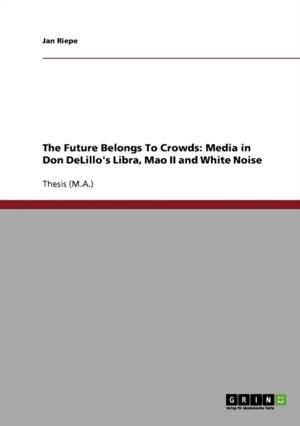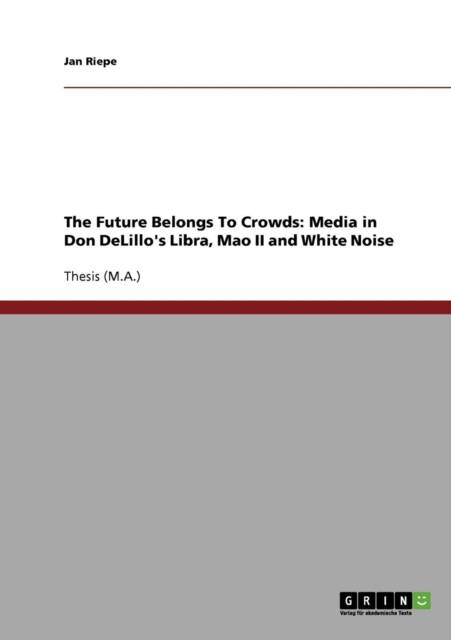
- Retrait gratuit dans votre magasin Club
- 7.000.000 titres dans notre catalogue
- Payer en toute sécurité
- Toujours un magasin près de chez vous
- Retrait gratuit dans votre magasin Club
- 7.000.0000 titres dans notre catalogue
- Payer en toute sécurité
- Toujours un magasin près de chez vous
The Future Belongs To Crowds
Media in Don DeLillo's Libra, Mao II and White Noise
Jan Riepe
Livre broché | Anglais
79,95 €
+ 159 points
Description
Thesis (M.A.) from the year 2006 in the subject American Studies - Literature, grade: 2,0, University of Freiburg (Englisches Seminar), course: Magisterprüfung, language: English, abstract: This paper analyzes the treatment of media in novels by Don DeLillo. Key concepts in the study of media will be presented and explained in regard to how they are represented in DeLillo's novels. The focus will be on the novels and not on the media, after all this is a master's thesis in Literary and not in Communications Studies. Media and media theory, in our age of information capitalism are, now more than ever before, a topic that deserves close scholarly attention. Media theorists agree that to study the media is to study one of the most important topics of the day and that "such study should be compulsory part of every citizens liberal education" (Fred Inglis. Media Theory. An Introduction. Oxford: Basil Blackwell, 1990. p. 6). Most people in their daily lives are permanently surrounded by media. No matter if it is our entertainment, information, health, knowledge, memory, identity, dreams, emotions, or even our dying - all have by now been incorporated by the media. It is impossible to understand our acting and thinking without considering the influence of mediation. The entire history of mankind is inseparable from media, from language to the alphabet and the printing press all the way to today's instant electronic communication. "Every interpretation of anything is medially determined"(Arjen Mulder. Understanding Media Theory. Language, Image, Sound, Behavior. Rotterdam: V2_Publishing/NAi Publishers, 2004. p. 179), media are our means of understanding, it is through them that we try to make sense of the world. As this paper will show, the mass media now have an enormous influence of both public and private life of Western culture, in fact individuals as much as nations today formulate their agendas, memories, and identities in response to valu
Spécifications
Parties prenantes
- Auteur(s) :
- Editeur:
Contenu
- Nombre de pages :
- 134
- Langue:
- Anglais
Caractéristiques
- EAN:
- 9783638827430
- Date de parution :
- 15-10-07
- Format:
- Livre broché
- Format numérique:
- Trade paperback (VS)
- Dimensions :
- 148 mm x 210 mm
- Poids :
- 181 g

Les avis
Nous publions uniquement les avis qui respectent les conditions requises. Consultez nos conditions pour les avis.






